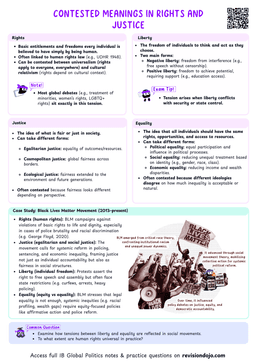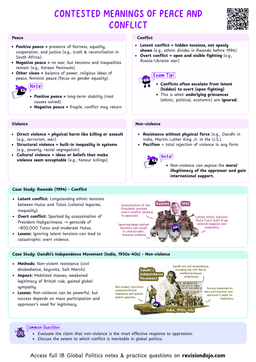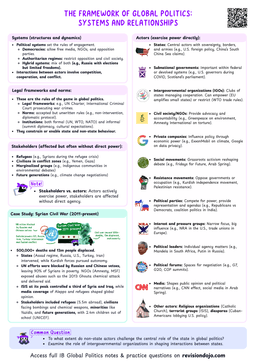Understanding Inequality in Global Politics
What Is Inequality?
Inequality
Inequality refers to the uneven distribution of resources, opportunities, and power among individuals, groups, or nations.
- It manifests in various forms, including:
- Economic Inequality: Differences in income, wealth, and access to resources.
- Social Inequality: Disparities in education, healthcare, and social mobility.
- Political Inequality: Unequal access to political power and decision-making.
- Global Inequality: The gap between developed and developing countries in terms of economic growth, technology, and living standards.
- Inequality is not just about economic differences. It encompasses social, political, and cultural dimensions that affect individuals and communities worldwide.
The Causes of Inequality
- Historical Factors
- Colonialism: Exploitation of resources and people created long-lasting economic disparities.
- Slavery: Systemic oppression and economic exploitation of marginalized groups.
- Economic Systems
- Capitalism: While promoting growth, it can lead to wealth concentration and social stratification.
- Globalization: Benefits are often unevenly distributed, favoring developed nations and multinational corporations.
- Political Structures
- Corruption: Diverts resources away from public goods and services.
- Weak Institutions: Inability to enforce laws and protect rights exacerbates inequality.
- Social and Cultural Norms
- Discrimination: Based on race, gender, ethnicity, or religion limits opportunities for marginalized groups.
- Patriarchy: Reinforces gender inequality in many societies.
- When analyzing inequality, consider both structural factors (e.g., economic systems) and individual experiences (e.g., discrimination). This holistic approach provides a deeper understanding of the issue.
The Impact of Inequality
- Economic Consequences
- Reduced Growth: Inequality can hinder economic development by limiting access to education and healthcare.
- Poverty: Concentration of wealth leaves many without basic necessities.
- Social Consequences
- Social Unrest: Disparities can lead to protests, violence, and instability.
- Health Disparities: Unequal access to healthcare results in higher mortality rates and lower life expectancy for marginalized groups.
- Political Consequences
- Erosion of Democracy: Political inequality undermines democratic institutions and processes.
- Policy Bias: Governments may prioritize the interests of the wealthy over the needs of the broader population.
- The 2011 Arab Spring uprisings were partly fueled by economic inequality and political corruption, highlighting the interconnectedness of these issues.
Global Inequality: A Closer Look
- North-South Divide
- The North (developed countries) enjoys higher living standards, technological advancements, and economic stability.
- The South (developing countries) faces challenges like poverty, conflict, and environmental degradation.
- Trade and Investment
- Unequal Trade Agreements: Favor developed nations, limiting opportunities for developing countries.
- Foreign Direct Investment (FDI): Often benefits multinational corporations more than local communities.
- Technology and Innovation
- Digital Divide: Lack of access to technology and the internet exacerbates global inequality.
- Intellectual Property Rights: Restrict access to essential medicines and technologies in developing countries.
- The North-South divide is a simplified model, but it highlights systemic inequalities in the global economic and political system.
Addressing Inequality: Strategies and Challenges
- Policy Interventions
- Progressive Taxation: Redistributes wealth and funds public services.
- Social Safety Nets: Provide support for vulnerable populations, such as unemployment benefits and healthcare.
- International Cooperation
- Sustainable Development Goals (SDGs): Aim to reduce inequality within and among countries by 2030.
- Debt Relief: Helps developing countries invest in infrastructure and social programs.
- Empowerment and Inclusion
- Education and Training: Enhance skills and opportunities for marginalized groups.
- Political Participation: Encourage inclusive governance and representation.
- The Bolsa Família program in Brazil provides cash transfers to low-income families, conditional on school attendance and healthcare check-ups. This approach has reduced poverty and improved social outcomes.
Challenges in Addressing Inequality
- Political Resistance
- Elite Interests: Wealthy and powerful groups may oppose redistributive policies.
- Populism: Can exploit inequality without offering sustainable solutions.
- Global Economic Structures
- Trade Imbalances: Persist despite efforts to create fairer agreements.
- Climate Change: Disproportionately affects developing countries, exacerbating existing inequalities.
- Cultural and Social Barriers
- Deep-Rooted Discrimination: Requires long-term efforts to change societal norms and attitudes.
- Don't assume that economic growth alone will reduce inequality. Without targeted policies, growth can actually widen the gap between rich and poor.
Theoretical Perspectives on Inequality
- Liberalism
- Emphasizes individual rights and equal opportunities.
- Advocates for free markets but recognizes the need for regulation to address market failures.
- Marxism
- Views inequality as inherent to capitalist systems.
- Calls for the redistribution of wealth and the abolition of class structures.
- Feminism
- Highlights gender inequality and the intersection of race, class, and other identities.
- Advocates for policies that address systemic discrimination and empower women.
- Postcolonialism
- Focuses on the legacy of colonialism and its impact on global inequality.
- Critiques Western-centric development models and advocates for decolonization and self-determination.
- How do different cultural perspectives shape our understanding of inequality?
- Consider how values like individualism or collectivism influence policy approaches in different regions.


